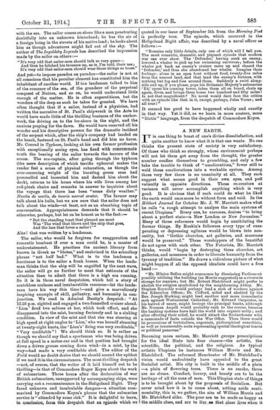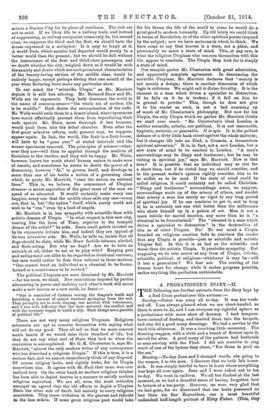A NEW EARTH.
TT is one thing to boast of one's divine dissatisfaction, and quite another to know what it is that one wants. No one thinks the present state of society is very satisfactory. Of those who think so strongly, whose environment perhaps will not let them get away from the thought, the greater
number confine themselves to grumbling, and only a few take the trouble to think of "ameliorations," fewer still to
weld those ameliorations into a workable system. Among these very few there is no unanimity at all. They each
suggest what seems good in their own eyes, and pull valiantly in opposite directions. These re-creators at variance will never accomplish anything which is very good. It is obvious that if each could do what he liked the earth would once more be without form and void. In the
Hibbert Journal for October Mr. J. W. Marriott makes what he calls "a rough attempt to analyse the main systems of recent Utopians." Every one, he assumes, desires "to bring about a perfect state—a New London or New Jerusalem." Many of these reformers would begin by annihilating the
former things. By Ruskin's followers every type of exas- perating or depressing ugliness would be blown into non- entity, but "Gothic churches, art galleries, and museums would be preserved." These worshippers of the beautiful do not agree with each other. The Futurists, Mr. Marriott thinks, would "begin by destroying these churches, art galleries, and museums in order to liberate humanity from the tyranny of tradition." He draws a ridiculous picture of what might happen if all the opposed idealists could have a free hand :—
" Mr. Hilaire Belloc might commence by dismissing Parliament possibly utilising the building (as Morris suggested) as a riverside storage for manure; but Mr. Robert Blatchford might prefer to abolish the religion symbolised by the neighbouring Abbey. Mr. Stephen Reynolds would perhaps lead a mob of workers against the Education Offices ; Dr. Clifford, aided and abetted by the Rev. Joseph Hocking, might lead another and moro iconoclastic mob against Westminster Cathedral ; Mr. Edward Carpenter, in his hatred of usury, might besiege the principal banks, although Mr. Norman Angell would probably rush to the rescue, because the banking systems have knit the world into organic unity ; and after effecting their relief, he would attack the Nietzscheans with a cannonade of facts outside the War Office. Then there would be processions of teetotallers, eugenists, philosophical anarchists, as well as innumerable sects representing special theological tenets or political panaceas."
Becoming more serious, Mr. Marriott groups prescriptions for the ideal State into four classes—the artistic, the scientific, the political, and the religious. As typical artistic Utopians he instances William Morris and Mr. Blatchford. The reformed Manchester of Mr. Blatchford's vision would undoubtedly have appealed to the great Socialist artist. His city is built in the middle of a plain —a plain of flowering trees. There is no smoke, there are no slums. Comfort, luxury, and beauty are to be the heritage of all the sons of men. This Utopian state of things is to be brought about by the proposals of Socialism. But
never mind how it is to come about, setting aside senti- mentality, this is, we gather, the aim of William Morris and
Mr. Blatchford alike. The poor are to be made as happy as the middle class, and are to liv,e,as that .lass ,11yes when it
selects a Garden City for its place of residence. The rich are not to exist. If we liken life to a railway train, and instead of suppressing, as railway companies commonly do, the second class, we suppress the third and the first, we should have the dream expressed in a metaphor. It is easy to laugh at it. A world from which squalor had departed would surely be a better world than the present; but we should be dull without the insouciance of the first-- and third-class passengers, and we doubt whether the city, weighed down as it would be with the anxiety and doubt which are such prominent characteristics of the beauty-loving section of the middle class, would be entirely happy, except perhaps during that one month of the year when flowering trees make any particular show.
To our mind, the "scientific Utopia" as Mr. Marriott depicts it is still less alluring. Mr. Bernard Shaw and Mr. Wells are its exponents. They both denounce the world in the name of common-sense—"the whole sin of modern life is its muddle." Both desire the extermination of the unfit. Mr. Wells would exile them to a desert island, where tyrannous laws would effectually prevent them from reproducing their unfit species. Mr. Shaw, more thorough if less humane,
would push them into the lethal chamber. Even after the first great selective reform, unfit persons may, we suppose, appear again. In fact, the world, like fruit in a fruit-house, will have to be "gone over" at stated intervals and the worser specimens removed. The principles of science—what- ever they are—will then be applied through the medium of Socialism to the residue, and they will be happy. Mr. Wells, however, knows too much about human nature to make sure of results, and sometimes he seems to doubt the power of a democracy, however "fit," to govern itself, and develops in more than one of his books a notion of a governing class which, to quote Mr. Marriott, "runs the nation on rational lines." This is, we believe, the commonest of Utopian dreams—a secret aspiration of the great mass of the men we speak of as educated. It would certainly make every one happier, every one that the middle class calls any one—every
one, that is, but "the nation" itself, which surely could not wish to be "run" even by a host of angels.
Mr. Marriott is in less sympathy with scientific than with artistic dreams of Utopia. "In what respect is this new city, roaring like the loom of Time, superior to the tranquil dream of the artist?" he asks. Some small points insisted on by its exponents irritate him, and indeed they are typical of its less attractive side. Mr. Wells, be tells us, insists that all dogs should be slain, while Mr. Shaw forbids tobacco, alcohol, and flesh-eating. But why no dogs P Are we to have no animals at all, either to eat or to play with ? Keeping pets and eating meat are alike to be regarded as irrational customs; but men would rather be free than rational in these matters. "One cannot treat an individual as a chemical to be formu- larised or a contrivance to be worked."
The political Utopians are soon dismissed by Mr. Marriott —far too soon, we think. New restrictions imposed by parties alternating in power and undoing each other's work will never make a new heaven or a new earth, be fears :—
"One is reminded of Cadmus sowing the dragon's teeth and beholding a harvest of armed warriors springing from the soil. They promptly set to work, slaying one another with vehemence, and it was with difficulty that the hero arrested the conflict and with the remnant began to build a city. Such things are a parable of political life."
There are not very many religious Utopians. Religious reformers are apt to concern themselves with saying what will not do any good. They all tell us that we must convert men's hearts if we would raise their standard of life, but
they do not say what sort of State they look to when the conversion is accomplished. Mr. G. K. Chesterton is, says Mr.
Marriott, "almost the only modern writer of any consequence who has described a religious Utopia." If this is true, it is a curious fact, and we cannot immediately think of any disproof. Of course religion looks, and rightly looks, for its Utopia somewhere else. It agrees with St. Paul that none was ever realized here. On the other hand, no modern religious thinker Las been able to depict heaven in a manner to satisfy modern religious aspiration. We are all, even the most orthodox amongst us, agreed that the old efforts to depict a Utopian State the other side of death fail entirely to carry religious conviction. They rouse irritation in the gravest and ridicule in the less sedate. If some great religious poet would take for his theme the life of the world to come he would do a great good to modern humanity. Up till lately we could think in terms of Revelation, or of the other spiritual poems inspired by the subject ; now we have no terms in which to think. We have come to say that heaven is a state, not a place, and presumably we mean a state of mind. This, at any rate, is what the religious Utopians who concern themselves with this life appear to conclude. The Utopia they look for is simply a state of mind.
Our essayist quotes Mr. Chesterton with great admiration, and apparently complete agreement. In denouncing the scientific Utopians, Mr. Marriott declares that "society is not merely a design; there is another dimension of which logic is oblivious. We might call it divine frivolity. It is the element in a man which drives a specialist to distraction. If he falls on it he is broken; if it fall on him he is ground to powder." This, though he does not give it to his reader as such, is not a bad summing up of much of Mr. Chesterton's philosophy. But now for his Utopia, the only Utopia which we gather Mr. Marriott thinks we shall ever reach. "Mr. Chesterton's ideal London is neither scientific, artistic, nor political. It is not reasonable, hygienic, msthetic, or peaceable. It is epic. It is the gallant defence of a dirty little back street against the whole universe ; but it changes life into an Iliad, a Crusade, a tremendous spiritual adventure." It is, in fact, not a new London, but a. new state of mind to be reached in London. "A man's surroundings may be dingy and loathsome ; but he may be rioting in spiritual joy," says Mr. Marriott. Now is that true? It is possible that an individual may so riot for a short time, but if be rioted long we should consider, and in the present writer's opinion rightly consider, him to be so selfish as to be mad. If his state of mind could be called religious, it could certainly not be called Christian. "Dingy and loathsome" surroundings mean, we suppose, surroundings made up of the misery of others, and amidst that misery a man has surely no right to any long period of spiritual joy. If he can continue to get it, and to keep it, he is certainly not one whit better than the millionaire who shuts himself up in a palace of art. Man is not a mere vehicle for sacred emotion, any more than he is "a. chemical to be formularised." The "element in a man which drives a specialist to distraction" is the destruction of this as of other Utopias. No? To our mind a Utopia founded on religious emotion fails to convince the reader that any Utopia is possible—just as scientific and artistic Utopias fail. In this it is as bad as the scientific and worse than the artistic Utopia. It precludes sympathy. But supposing we do ever arrive at any form of Utopia, 3 rti-;tic, scientific, political, or religious—whichever it may be—will it last a generation ? We fear not. The craving of the human heart for change, while it makes progress possible, makes anything like perfection unthinkable.



































 Previous page
Previous page